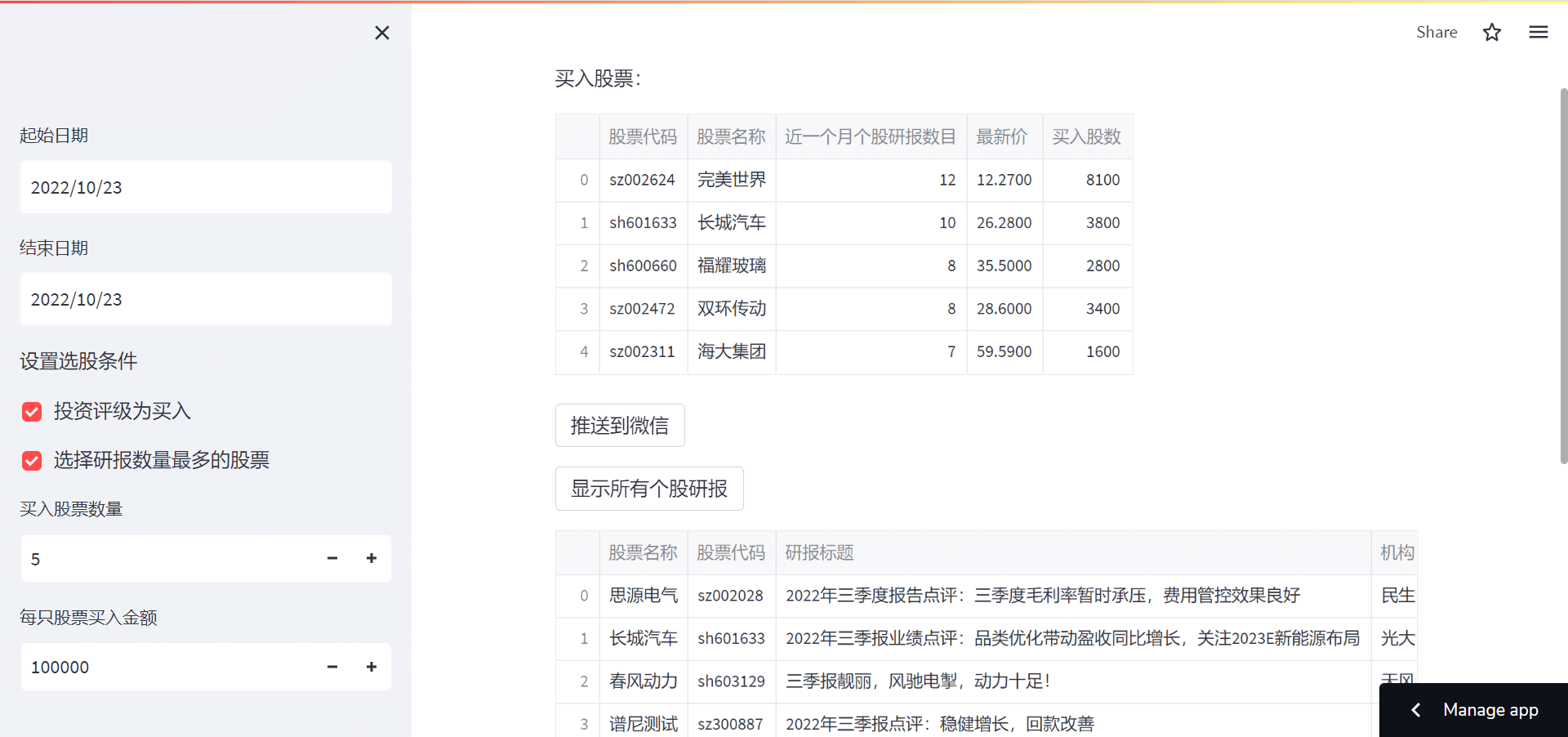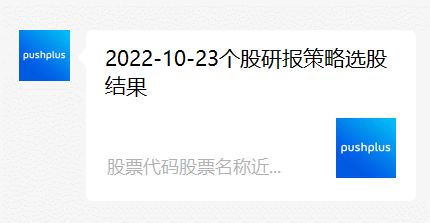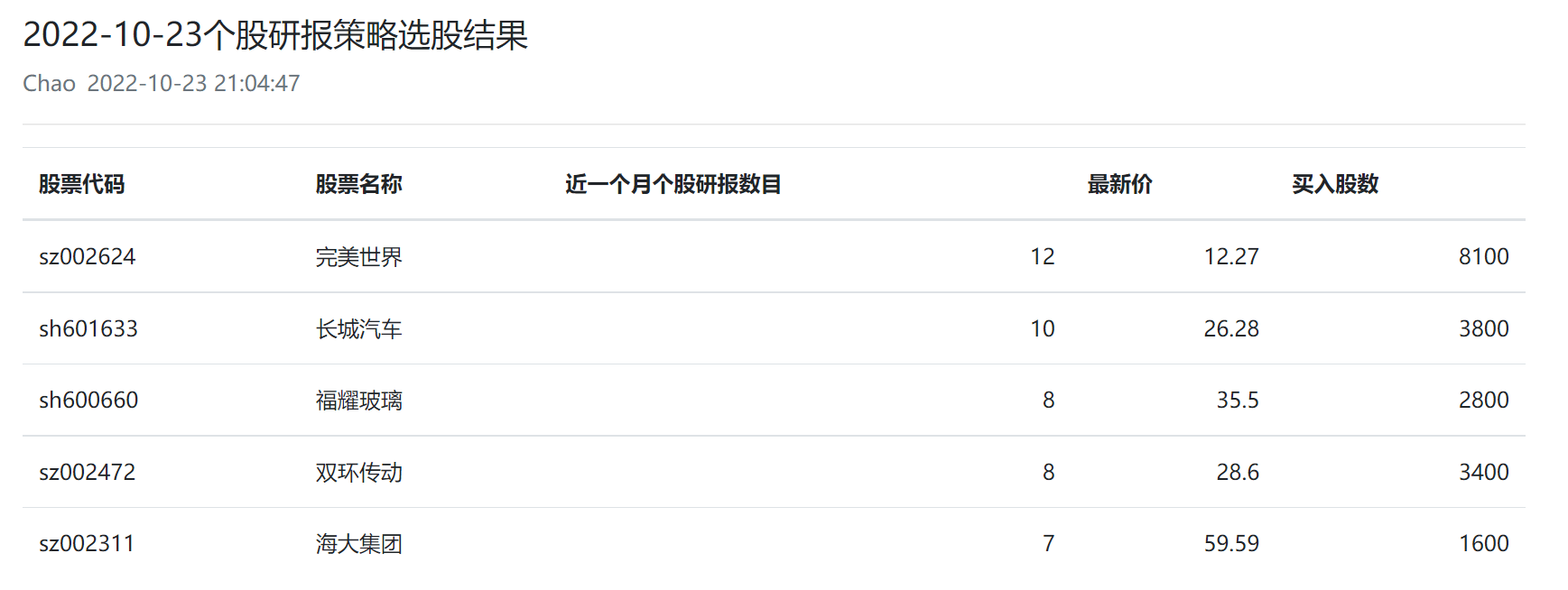个股研报事件策略&选股结果自动推送到微信¶
基于东方财富网的个股研报数据进行事件策略选股,并实现自动化筛选股票和推送选股结果。

策略逻辑:选择当天发布的研报中评级为“买入”(最高评级)的股票,按照“近一个月个股研报数目”降序排列,选择前若干只股票进行等权买入。
将策略代码部署到Streamlit上,定期执行事件选股策略并将选股结果推送到微信,可以大大节省重复运行策略代码的时间,提高交易的执行效率。
东方财富网个股研报数据爬虫¶
Python
from urllib.request import urlopen # python 自带爬虫库
import json # python 自带的 JSON 数据库
import pandas as pd
import time
import datetime
def change(x):
if x[:1] == "6" or x[:3] == "900":
return "sh" + x
elif x[:2] == "00" or x[:2] == "30" or x[:3] == "200":
return "sz" + x
else:
return x
def get_research_report_data(begin_time, until_time):
"""
获取个股研报历史数据,设置起始时间和结束时间
:param until_time:
:param begin_time: 起始时间 格式为'2020-06-01'
:param until_time: 起始时间 格式为'2020-06-01'
:return:
"""
# http://data.eastmoney.com/report/stock.jshtml
if len(begin_time.split("-")) != 3:
print("begin_tiem_str 格式有误 格式为’%Y-%m-%d‘")
return None
try:
ts = int(time.time() * 1000)
if until_time is None:
until_time = now_date.strftime("%Y-%m-%d")
pageNum = 1
data = []
while True:
url_1 = "http://reportapi.eastmoney.com/report/list?cb=datatable4263982&industryCode=*&pageSize=100&industry=*&rating=*&ratingChange=*&beginTime=%s&endTime=%s&pageNo=%d&fields=&qType=0&orgCode=&code=*&rcode=&_=%d"
url_stockResearch = url_1 % (begin_time, until_time, pageNum, ts)
content = urlopen(url_stockResearch).read().decode("utf-8")
content = content.split("(", maxsplit=1)[-1][:-1] # 去掉括号
# content_0 = content_0.split(")", maxsplit=1)[0] # 去掉右括号
content_1 = json.loads(content) # 自己去仔细看下这里面有什么数据
if content_1["data"]:
df = pd.DataFrame(content_1["data"])
else:
print("今日个股研报无数据")
break
df_0 = df[
[
"stockName",
"stockCode",
"title",
"orgName",
"orgSName",
"predictThisYearPe",
"predictThisYearEps",
"predictNextYearPe",
"predictNextYearEps",
"predictNextTwoYearPe",
"predictNextTwoYearEps",
"indvInduName",
"indvInduCode",
"emRatingName",
"lastEmRatingName",
"count",
"publishDate",
]
].copy()
df_0.rename(
columns={
"stockName": "股票名称",
"stockCode": "股票代码",
"title": "研报标题",
"orgName": "机构",
"orgSName": "机构名称",
"predictThisYearPe": "预测今年市盈率",
"predictThisYearEps": "预测今年每股收益",
"predictNextYearPe": "预测明年市盈率",
"predictNextYearEps": "预测明年每股收益",
"predictNextTwoYearPe": "预测后年市盈率",
"predictNextTwoYearEps": "预测后年每股收益",
"indvInduName": "行业名称",
"indvInduCode": "行业代码",
"emRatingName": "评级",
"lastEmRatingName": "上次评级",
"count": "近一个月个股研报数目",
"publishDate": "发布日期",
},
inplace=True,
)
data.append(df_0)
print("已爬取第%d页,当前页有%d行数据" % (pageNum, len(df_0)))
pageNum += 1
time.sleep(1)
if not data:
return None
else:
total = pd.concat(data, ignore_index=True)
total["股票代码"] = total["股票代码"].apply(lambda x: change(x))
return total
except Exception as e:
print("报错,报错内容:", str(e))
return None
获取指定日期范围的个股研报数据(默认为当日)¶
Python
now_date = datetime.datetime.now()
begin_time = st.sidebar.date_input("起始日期", now_date)
until_time = st.sidebar.date_input("结束日期", now_date)
begin_time_str = begin_time.strftime("%Y-%m-%d")
until_time_str = until_time.strftime("%Y-%m-%d")
data = get_research_report_data(begin_time_str, until_time_str)
通过Akshare获取股票最新行情数据¶
设置选股条件¶
Python
st.sidebar.write("设置选股条件")
# 设置选股条件,对股票进行筛选
condition = None
# 评级为最高等级的买入
if st.sidebar.checkbox("投资评级为买入", True):
condition = data["评级"] == "买入"
# 应用选股条件
selected_stock = data[condition]
if st.sidebar.checkbox("选择研报数量最多的股票", True):
selected_stock = selected_stock.sort_values(by="近一个月个股研报数目", ascending=False)
# 删除重复的股票
selected_stock.drop_duplicates(subset=["股票代码"], keep="first", inplace=True)
# 重新索引
selected_stock.index = range(len(selected_stock))
# 设置买入股票数量
buy_num = st.sidebar.number_input("买入股票数量", 1, None, 5)
# 求出买入股票的代码和名称
buy_stock = selected_stock[["股票代码", "股票名称", "近一个月个股研报数目"]][:buy_num]
结合最新价,计算应买入的股票数量¶
Python
# 每只股票买入金额
buy_money = st.sidebar.number_input("每只股票买入金额", 1, None, 100000, 10000)
# 删除代码中的前缀
buy_stock["代码"] = buy_stock["股票代码"].apply(lambda x: x[2:])
# 获取股票的实时数据
price = get_price()
# 将最新价合并到买入股票的代码和名称中
buy_stock = pd.merge(buy_stock, price, on="代码", how="left")
# 计算每只股票买入的股数
buy_stock["买入股数"] = buy_stock["最新价"].apply(lambda x: int((buy_money // x) // 100 * 100))
通过pushplus推送到微信¶
Python
# 开始推动到 pushplus
if st.button("推送到微信"):
# 推送标题
title = now_date.strftime("%Y-%m-%d") + "个股研报策略选股结果"
# 将 buy_stock 转换为 Markdown 格式
buy_stock_md = buy_stock.to_markdown(index=False)
# 推送内容
content = buy_stock_md
template = "markdown"
headers = {"Content-Type": "application/json"}
url = (
"http://www.pushplus.plus/send?token="
+ token
+ "&title="
+ title
+ "&content="
+ content
+ "&template="
+ template
)
requests.get(url)
st.success("推送成功")
推送到微信:

点击消息后可看到选股结果表格:

